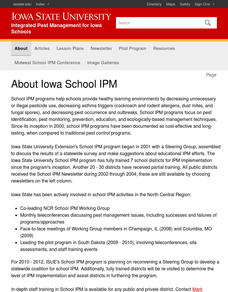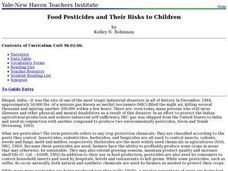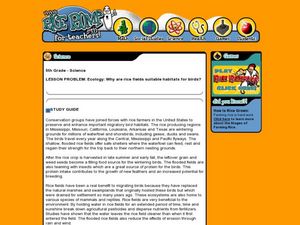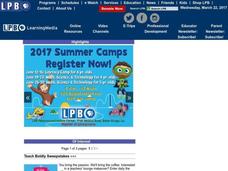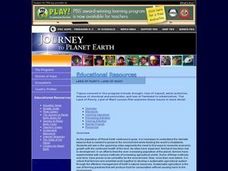Curated OER
PESTICIDES AS CHEMICAL TOOLS IN IPM
Tenth graders explore the importance of pesticides as chemical tools. The chemistry of a pesticide is important for understanding the composition of the product, the classification of pesticides according to their use and the...
Curated OER
Organic Farming / Agriculture
Want an organic farming resource packed with experiments, background information, science fair projects, and topics of interest for further research? Here it is. Young environmental scientists can explore concepts involved in organic...
Curated OER
Food Pesticides and Their Risks to Children
Pupils examine an industrial disaster in India which affected the food for generations to come. In groups, they research the history of pesticides and place them into groups based on the type of pests they control. They partcipate in a...
Curated OER
Organic Mechanic Part I
On day one of the "Organic Mechanic Part I" lesson, learners try to remove the waxy coating of an apple and consider pesticides that may be represented by this addition to our food. On day two, they research pesticides online and...
Curated OER
The Global Impact of Insect Borne Diseases & Agriculture
Students study the global impact of insect borne diseases, the appropriate use of pesticides, and the concept of human interrelations on a world wide scale. They examine how to safely apply a pesticide, according to the label.
Curated OER
Sustainable Agriculture
Students perform an experiment to find out if plants grow best when grown in soil with no fertilizer, with chemical fertilizers, or with compost that they have made themselves. Students discover how agriculture practices can benefit the...
Curated OER
Ecology: Why Are Rice Fields Suitable Habitats for Birds?
Fifth graders discover the uses for rice by reading about the habitats of certain birds. In this agriculture lesson, 5th graders research birds from the Gulf Coast and California and their reasons for living in rice fields. Students...
Curated OER
When Is a Pest an Insect?
Learners view the importance of insects as pollinators. They are now posed with the problem--those insects are nice--but insects are pests right? Students explore their description of pests and pesticides.
Curated OER
What's Organic?
Students define and discuss terms organic and synthetic, read article pertaining to organic agricultural practices in Oklahoma, complete worksheet, grow plants using both commercial and organic fertilizer, compare growth rates, and chart...
Curated OER
How Does Your Garden Grow?
Learners explore how to use natural fertilizers and pesticides by growing an organic vegetable garden by growing plants and using a variety of soil amendments.
Curated OER
Land of Plenty, Land of Want
Students view a video about the state of the environment. They discover the topic of sustainable agriculture. They identify problems and how to solve them.
Balanced Assessment
County Concerns
Apply area concepts to help farmers and settle county disputes. Scholars use a given diagram and information about an insecticide spraying campaign to determine the monetary benefit to farmers. They then decide which of two counties has...
Curated OER
From the Farm to Your Table: Where Does Our Food Come From?
Students discover where the food they eat comes from. Using maps, they identify the agricultural areas of the United States and the products that are grown in each area. Using the internet, they research how food gets to America from...
Curated OER
The Risks of Everyday Living
Students compare their perceptions of risk to the perceptions of scientists and risk professionals. in small groups, they evaluate risks on a scale of 1 to 10 for the average American on a yearly basis.
Curated OER
Manduca
Students investigate the basic survival needs of both hornworms and humans. They compare and contrast the them by making a class list.
Curated OER
Rock River Watershed
Students discover what a watershed is and which one they live in. Using the internet, they research why watersheds are important to an ecosystem and how to keep them from getting polluted. They use a map to locate various items within a...
Curated OER
What's Organic?
Learners discuss background information presented by the teacher and read dictionary definitions for the words "organic" and "synthetic." For this gardengin lesson, students complete a worksheet on the material. Learners grow and compare...
Curated OER
BIOASSESSMENT OF STREAMS
Young scholars work as a team to gather organisms from a stream to evaluate if the water quality is excellent, good, or fair to poor.
Curated OER
From Bolls to Bolts
Fifth graders understand the importance of cotton in America. In this cotton instructional activity, 5th graders view a video on cotton from plant to market. Students examine cotton bolls and participate in other activities around the...
Curated OER
The Trail of a Snack Food
Students identify some of their favorite snack foods. Using this information, they discover the resources needed to produce the food. In groups, they research different alternatives to make their favorite food in order to protect the...
Curated OER
Water Pollution Graphing Activity
Students describe and identify the link between land use activities within a watershed and water quality. They evaluate the quality of a "water sample" ( a bag of skittles), graph their results, and form a hypothesis about the land use...


